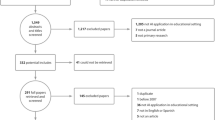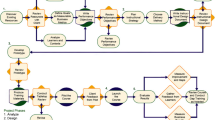Abstract
Intervention has long been practised in higher education to provide assistance for at-risk or underachieving learners. With the development of learning analytics, the delivery of intervention has been informed by data-driven approaches to identify learners’ problems and provide them with just-in-time and personalised support. However, intervention has been claimed to be the greatest challenge in learning analytics and has yet to be widely implemented. This paper reviews 24 case studies of learning analytics intervention in higher education. The cases were categorised and summarised according to their objectives, the data used, the intervention methods, the outcomes obtained and the challenges encountered. The results show that intervention practices have focused most frequently on increasing students’ study performance, offering personalised feedback and improving student retention. The frequent types of data involved students’ online learning behaviours, study performance, demographics and course selection information. The most commonly used intervention methods involved offering personalised recommendations and visualising learning data. The interventions have led to outcomes such as enhancing study performance, retention and course registration, as well as productivity and effectiveness in learning and teaching. The challenges covered a wide range of aspects, including the scalability of intervention, conditions for implementing intervention, limitations of the channels for delivering intervention and the evaluation of intervention effectiveness. The results suggest that learning analytics intervention has the potential to further extend its scope of practices to serve a wider range of purposes, but more studies on the empirical evidence, even with null or negative results, are needed to support its long-term effectiveness and sustainability.
Similar content being viewed by others
Notes
Relevant articles were found on Scopus and the Web of Science starting from 2011.
References
Beattie, S., Woodley, C., & Souter, K. (2014). Creepy analytics and learner data rights: Proceedings of the Ascilite 2014 Conference (pp. 421–425). Dunedin, New Zealand.
Bramucci, R., & Gaston, J. (2012). Sherpa: Increasing student success with a recommendation engine: Proceedings of the 2nd International Conference on Learning Analytics and Knowledge – LAK’12 (pp. 82–83). Vancouver, Canada.
Cerezo, R., Suarez, N., Núñez, J. C., & Sánchez-Santillán, M. (2014). eGraph tool: Graphing the learning process in LMSs: Proceedings of the 4th International Conference on Learning Analytics and Knowledge – LAK’14 (pp. 273–274). Indianapolis, Indiana, USA.
Choi, S. P. M., Lam, S. S., Li, K. C., & Wong, B. T. M. (2018). Learning analytics at low cost: At-risk student prediction with clicker data and systematic proactive interventions. Educational Technology & Society,21(2), 273–290.
Clow, D. (2012). The learning analytics cycle: Closing the loop effectively: Proceedings of the 2nd International Conference on Learning Analytics and Knowledge (pp. 134–138). Vancouver, Canada.
Clow, D. (2013). An overview of learning analytics. Teaching in Higher Education,18(6), 683–695.
Corrin, L., Kennedy, G., de Barba, P. G., Lockyer, L., Gaševic, D., Williams, D., & Bakharia, A. (2016). Completing the loop: Returning meaningful learning analytic data to teachers. Retrieved from http://melbourne-cshe.unimelb.edu.au/data/assets/pdffile/0006/2083938/Loop_Handbook.pdf.
Dodge, B., Whitmer, J., & Frazee, J. P. (2015). Improving undergraduate student achievement in large blended courses through data-driven interventions: Proceedings of the Fifth International Conference on Learning Analytics and Knowledge (pp. 412–413). New York, USA.
Espinoza, P., & Genna, G. M. (2018). Hi, I want to talk to you about your progress: A large course intervention for at-risk college students. Journal of College Student Retention: Research, Theory & Practice. https://doi.org/10.1177/1521025118790054.
Fuchs, D., Mock, D., Morgan, P., & Young, C. (2003). Responsiveness-to-intervention: Definitions, evidence, and implications for the learning disabilities construct. Learning Disabilities Research and Practice,18(3), 157–171.
Gašević, D., Dawson, S., & Pardo, A. (2017). How do we start? State and directions of learning analytics adoption. International Council for Open and Distance Education. Retrieved from https://icde.memberclicks.net/assets/RESOURCES/dragan_la_report%20cc%20licence.pdf.
Gašević, D., Dawson, S., Rogers, T., & Gašević, D. (2016). Learning analytics should not promote one size fits all: The effects of instructional conditions in predicting academic success. The Internet and Higher Education,28, 68–84.
Grann, J., & Bushway, D. (2014). Competency map: Visualizing student learning to promote student success: Proceedings of the 4th International Conference on Learning Analytics and Knowledge – LAK’14 (pp. 267–268). Indianapolis, USA.
Grawemeyer, B., Mavrikis, M., Holmes, W., Gutierrez-Santos, S., Wiedmann, M., & Rummel, N. (2016). Affecting off-task behaviour: How affect-aware feedback can improve student learning: Proceedings of the 5th International Conference on Learning Analytics and Knowledge – LAK’16 (pp. 104–113). Edinburgh, United Kingdom.
Jayaprakash, S. M., & Lauría, E. J. M. (2014). Open academic early alert system: Technical demonstration: Proceedings of the 4th International Conference on Learning Analytics and Knowledge – LAK’14 (pp. 267–268). Indianapolis, USA.
Khalil, M., & Ebner, M. (2015). Learning analytics: Principles and constraints: Proceedings of World Conference on Educational Multimedia, Hypermedia and Telecommunications 2015 (pp. 1326–1336). Montréal, Canada.
Kimberly, E. A., & Pistilli, M. D. (2012). Course signals at Purdue: Using learning analytics to increase student success. In Proceedings of the 2nd International Conference on Learning Analytics and Knowledge – LAK’12 (pp. 267–270). Vancouver, Canada.
Li, K. C., Ye, C. J., & Wong, B. T. M. (2018). Status of learning analytics in Asia: Perspectives of higher education stakeholders. In Lam, et al. (Eds.), Technology in education: Innovative solutions and practices (pp. 267–275). New York: Springer.
Lonn, S., Aguilar, S., & Teasley, S. D. (2013). Issues, challenges, and lessons learned when scaling up a learning analytics intervention: Proceedings of the 3rd International Conference on Learning Analytics and Knowledge – LAK’13 (pp. 235–239). Leuven, Belgium.
Lonn, S., Aguilar, S. J., & Teasley, S. D. (2015). Investigating student motivation in the context of a learning analytics intervention during a summer bridge program. Computers in Human Behaviour,47, 90–97.
Lu, O. H. T., Huang, J. C. H., Huang, A. Y. Q., & Yang, S. J. H. (2017). Applying learning analytics for improving students engagement and learning outcomes in an MOOCs enabled collaborative programming course. Interactive Learning Environments,25(2), 220–234.
McKay, T., Miller, K., & Tritz, J. (2012). What to do with actionable intelligence: E2Coach as an intervention engine: Proceedings of the 2nd International Conference on Learning Analytics and Knowledge (pp. 88–91). Vancouver, Canada.
McNely, B. J., Gestwicki, P., Hill, J. H., Parli-Horne, P., & Johnson, E. (2012). Learning analytics for collaborative writing: A prototype and case study: Proceedings of the 2nd International Conference on Learning Analytics and Knowledge – LAK’12 (pp. 222–225). Vancouver, Canada.
Miller, W. L., Baker, R. S., Labrum, M. J., Petsche, K., Liu, Y-H., & Wagner, A. Z. (2015). Automated detection of proactive remediation by teachers in reasoning mind classrooms: Proceedings of the 5th International Conference on Learning Analytics and Knowledge – LAK’15 (pp. 290–294). Poughkeepsie, New York.
Molinaro, M., Steinwachs, M., Li, Q., & Guzman-Alvarez, A. (2016). Promoting instructor and department action via simple, actionable tools and analyses: The 1st Learning Analytics for Curriculum and Program Quality Improvement Workshop (pp. 36–40). Edinburgh, UK.
Nam, S., Lonn, S., Brown, T., Davis, C. S., & Koch, D. (2014). Customized course advising: Investigating engineering student success with incoming profiles and patterns of concurrent course enrollment: Proceedings of the 4th International Conference on Learning Analytics and Knowledge – LAK’14 (pp. 267–268). Indianapolis, USA.
Rienties, B., Boroowa, A., Cross, S., Farrington-Flint, L., Herodotou, C., Prescott, L., Woodthorpe, J. (2016). Reviewing three case-studies of learning analytics interventions at the Open University UK: Proceedings of the Sixth International Conference on Learning Analytics & Knowledge (pp. 534–535). Edinburgh, United Kingdom.
Rienties, B., Cross, S., & Zdrahal, Z. (2017). Implementing a learning analytics intervention and evaluation framework: What works? In B. K. Daniel (Ed.), Big data and learning analytics in higher education (pp. 147–166). Heidelberg: Springer.
Rivera-Pelayo, V., Munk, J., Zacharias, V., & Braun, S. (2013). Live interest meter: Learning from quantified feedback in mass lectures: Proceedings of the 3rd International Conference on Learning Analytics and Knowledge – LAK’13 (pp. 23–27). Leuven, Belgium.
Santos, J. L., Verbert, K., Govaerts, S., & Duval, E. (2013). Addressing learner issues with StepUp!: An evaluation: Proceedings of the 3rd International Conference on Learning Analytics and Knowledge – LAK’13 (pp. 14–22). Leuven, Belgium.
Sclater, N. (2017). Learning analytics explained. New York: Routledge.
Sclater, N., & Bailey, P. (2015). Code of practice for learning analytics. Jisc. Retrieved from https://www.jisc.ac.uk/guides/code-of-practice-for-learning-analytics.
Sclater, N., Peasgood, A., & Mullan, J. (2016). Learning analytics in higher education: A review of UK and international practice. Jisc. Retrieved from https://www.jisc.ac.uk/reports/learning-analytics-in-higher-education.
Si Na, K., & Tasir, Z. (2017). A systematic review of learning analytics intervention contributing to student success in online learning: Proceedings of the 2017 International Conference on Learning and Teaching in Computing and Engineering (pp. 62–68). Hong Kong, China.
Siadaty, M., Gasevic, D., & Hatala, M. (2016a). Associations between technological scaffolding and micro-level processes of self-regulated learning: A workplace study. Computers in Human Behavior,55, 1007–1019.
Siadaty, M., Gasevic, D., & Hatala, M. (2016b). Measuring the impact of technological scaffolding interventions on micro-level processes of self-regulated workplace learning. Computers in Human Behavior,59, 469–482.
Siemens, G. (2012). Learning analytics: Envisioning a research discipline and a domain of practice. Paper presented in the 2nd International Conference on Learning Analytics and Knowledge. Vancouver, Canada.
Smith, V., Lange, A., & Huston, D. R. (2012). Predictive modeling to forecast student outcomes and drive effective interventions in online community college courses. Journal of Asynchronous Learning Networks,16(3), 51–61.
Sønderlund, A. L., Hughes, E., & Smith, J. (2018). The efficacy of learning analytics interventions in higher education: A systematic review. British Journal of Educational Technology. https://doi.org/10.1111/bjet.12720.
van Horne, S., Curran, M., Smith, A., van Buren, J., Zahrieh, D., Larsen, R., et al. (2018). Facilitating student success in introductory Chemistry with feedback in an online platform. Technology, Knowledge and Learning,23(1), 21–40.
van Leeuwen, A., Janssen, J., Erkens, G., & Brekelmans, M. (2015). Teacher regulation of cognitive activities during student collaboration: Effects of learning analytics. Computers & Education,90(1), 80–94.
Villano, R., Harrison, S., Lynch, G., & Chen, G. (2018). Linking early alert systems and student retention: A survival analysis approach. Higher Education,76(5), 903–920.
Wise, A. F. (2014). Designing pedagogical interventions to support student use of learning analytics: Proceedings of the 4th International Conference on Learning Analytics and Knowledge (pp. 203–211). Indiana, USA.
Wise, A. E., Zhao, Y., & Hausknecht, S. N. (2014). Learning analytics for online discussions: Embedded and extracted approaches. Journal of Learning Analytics,1(2), 48–71.
Wong, B. T. M. (2017). Learning analytics in higher education: An analysis of case studies. Asian Association of Open Universities Journal,12(1), 21–40.
Wong, W. Y., & Lavrencic, M. (2016). Using a risk management approach in analytics for curriculum and program quality improvement: the 1st Learning Analytics for Curriculum and Program Quality Improvement Workshop (pp. 10–14). Edinburgh, UK.
Wong, B. T. M., Li, K. C., & Choi, S. P. M. (2018). Trends in learning analytics practices: A review of higher education institutions. Interactive Technology and Smart Education,15(2), 132–154.
Xiong, X., Wang, Y., & Beck, J. B. (2015). Improving students’ long-term retention performance: A study on personalized retention schedules: Proceedings of the 5th International Conference on Learning Analytics and Knowledge – LAK’15 (pp. 325–329). Poughkeepsie, New York.
Acknowledgements
The work described in this paper was partially supported by a grant from the Research Grants Council of the Hong Kong Special Administrative Region, China (UGC/IDS16/15).
Author information
Authors and Affiliations
Corresponding author
Additional information
Publisher's Note
Springer Nature remains neutral with regard to jurisdictional claims in published maps and institutional affiliations.
Appendix
Rights and permissions
About this article
Cite this article
Wong, B.Tm., Li, K.C. A review of learning analytics intervention in higher education (2011–2018). J. Comput. Educ. 7, 7–28 (2020). https://doi.org/10.1007/s40692-019-00143-7
Received:
Revised:
Accepted:
Published:
Issue Date:
DOI: https://doi.org/10.1007/s40692-019-00143-7




